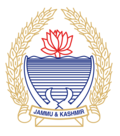| Chief Minister of Jammu and Kashmir | |
|---|---|
 | |
| Government of Jammu and Kashmir | |
| Style |
|
| Type | Head of government |
| Status | Leader of the Executive |
| Abbreviation | CM |
| Member of | |
| Reports to | |
| Residence | 40, Gupkar Road, Srinagar |
| Seat | Civil Secretariat Jammu, Old Heritage City, Jammu and Kashmir |
| Nominator | Members of the Government of Jammu and Kashmir in Jammu and Kashmir Legislative Assembly |
| Appointer | Lt. Governor of Jammu and Kashmir by convention based on appointees ability to command confidence in the Jammu and Kashmir Legislative Assembly |
| Term length | At the confidence of the assembly Chief minister's term is for five years and is subject to no term limits. |
| Inaugural holder | Ghulam Mohammed Sadiq |
| Formation | 30 March 1965 |
| Deputy | Deputy Chief Minister of Jammu and Kashmir |
| Salary |
|
| Website | Official website |
The chief minister of Jammu and Kashmir is the title given to the head of government of Jammu and Kashmir. As per the Constitution of India, the lieutenant governor is the union territory's de jure head, but de facto executive authority rests with the chief minister. Following elections to the Jammu and Kashmir Legislative Assembly, the lieutenant governor usually invites the party (or coalition) with a majority of seats to form the government. The lieutenant governor appoints the chief minister, whose council of ministers are collectively responsible to the assembly.
Contents
- List
- Prime ministers (Jammu & Kashmir)
- Prime ministers of the State of Jammu and Kashmir (1947–1965)
- Chief ministers of State of Jammu and Kashmir (1965–2019)
- Chief ministers of Union Territory of Jammu and Kashmir (2019-present)
- Statistics
- Prime Minister/Chief Minister of State/Union Territory of Jammu and Kashmir
- See also
- Notes
- References
The post was established after the 6th amendment to the state's constitution (effective 6 June 1965) abolished the title of Prime Minister of Jammu and Kashmir. [2] [3] [4] Subsequently, the then prime minister, Ghulam Mohammed Sadiq, was sworn in as the first chief minister of Jammu and Kashmir. The State of Jammu and Kashmir was bifurcated and reorganised as a union territory on 31 October 2019.
The office of the chief minister became vacant on 20 June 2018. Until 19 December 2018, the state was under governor's rule, and then under president's rule until 30 October 2019. After the state was reorganised into a union territory in October 2019, the president's rule was discharged via the lieutenant governor. The lieutenant governor served as the head of government of the union territory of Jammu and Kashmir until a new chief minister was in place following the 2024 Jammu and Kashmir Legislative Assembly election.











